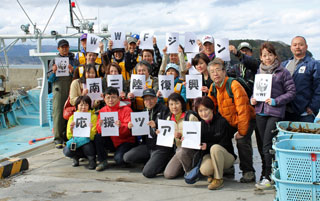- あなたの支援が必要です!
-

© Natalie Bowes / WWF-Canada 1年間その支援を継続すると…
南米のチリで海の大切さを伝え、地域の人たちにも
その保全に参加してもらう普及活動を
1回実施できます。
© Vladimir Filonov / WWF 1年間、その支援を継続すると…
野生のトラが生息する東南アジアの森で行なう
カメラトラップ調査のトレーニングを
実施できます。
© Ola Jennersten / WWF-Sweden 1年間、その支援を継続すると…
スマトラの熱帯林で、
違法伐採や野生動物の密猟を防ぐパトロールを
14日間、支えることができます。
© Natalie Bowes / WWF-Canada 毎月この金額を一年ご寄付頂くと…
南米のチリで海の大切さを伝え、地域の人たちにも
その保全に参加してもらう普及活動を
1回実施できます。
© Vladimir Filonov / WWF 毎月この金額を一年ご寄付頂くと…
野生のトラが生息する東南アジアの森で行なう
カメラトラップ調査のトレーニングを
実施できます。
© Ola Jennersten / WWF-Sweden 毎月この金額を一年ご寄付頂くと…
スマトラの熱帯林で、
違法伐採や野生動物の密猟を防ぐパトロールを
14日間、支えることができます。- 会員になる(毎月支援)
- 寄付をする(1度だけ支援)
What WWF Japan does
What WWF Japan Does
WWF Japan works on various conservation projects both nationally and internationally that Japan has significant humanity’s impacts on.
Forest

- Reforesting in Russian Far East to protect endangered Amur leopards and their habitats.
- Tackling illegal logging and wild crimes in National Parks in Sumatra by monitoring and patrolling the Parks with rescued orphan elephants and supporting local communities to establish ecotourism business as an alternative income source.
- Transforming markets and policies to reduce the impact of the production and consumption of commodities, and promoting sustainable consumptions of FSC certified wood products.
- Monitoring and researching the forests in Tesso Nilo, Sumatra, from illegal logging as one of leading projects of REDD (Reduction of Emission from Deforestation and forest Degradation).
- Restoring degraded rainforest in Borneo, Malaysia to save orangutan populations from extinction and to bring back ecologically thriving habitats for orangutan.
Marine

- Conserving the Yellow Sea Ecoregion, surrounded by China and the Korean Peninsula, through conducting scientific biodiversity assessments to identify high conservation value areas with Chinese and Korean marine research institutes, and working together with local community groups to achieve sustainable exploitation of marine resources.
- Restoring Nansei Islands, one of Japan’s ecologically important regions while strengthening local communities’ ability to conserve the natural resources they depend on.
- Bringing conservation into fisheries management by improving fisheries practice, recusing the impacts of fishing and promoting the consumption of MSC (Marine Stewardship Council) and ASC (Aquaculture Stewardship Council) certified sustainable seafood.
Wildlife

- Combining seven protected high conservation value spots in Eastern Himalaya into one large conservation area to provide better habitats and ecosystem for endangered species such as Bengal tiger, greater one-horned rhino, Asian elephant, snow leopard.
- Training rangers and strengthening the management system of National Parks in Central Africa to protect elephants, gorillas, tigers and chimpanzees and their habitats from poaching gangs and illegal logging with Central Africa Government.
- Protecting Japan’s endangered species and their habitats such as Asian bears while working with local communities and organizations.
Climate Change

- Mitigating the impact of climate change through promoting renewable energies, advancing policies to fight global warming and engaging with businesses to reduce carbon emissions.
Recovery Support

- Supporting fishery communities of Soma-shi, Fukushima and Minamisanriku-cho, Miyagi recover from the Great East Japan Earthquake by conducting environmental assessments to restart fishery in sustainable approach.
About
View WWF Japan in a larger map
Mitakokusai Bld.
3Fl.
1-4-28 Mita , Minato-ku,
Tokyo 108-0073 Japan
webform: info desk(Japanese Only)
Fax: +81-3-3769-1717
| Founded | September 1971 |
|---|---|
| Honorary Patron | His Imperial Highness Crown Prince Akishino |
| Chairperson | Takejiro Sueyoshi |
| CEO | TOBAI Sadayosi |
人と自然が調和して
生きられる未来を目指して
WWFは100カ国以上で活動している
環境保全団体です。




